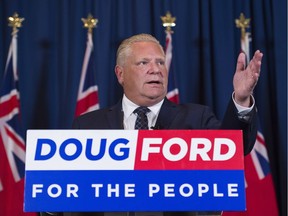Macpherson: Quebec and Ontario have traded places
Now it's Quebec that's the financially responsible, politically sensible province.

Article content
Quebec and Ontario have traded places, and not only because the Canadiens have replaced the Leafs as Canada’s NHL laughingstock.
It’s our economy that’s booming, with the unemployment rate at or near a record low, and in some months lower than our neighbour’s. On Friday, Statistics Canada reported that last month’s unemployment rate in Quebec was 5.3 per cent, to 5.7 per cent in Ontario.
We also have the more financially responsible government. There’s a consensus among our three major parties in favour of balancing the annual budget, while Ontario has lost control of its deficit. Our province’s credit rating now is better than Ontario’s.
It’s as though financially, Quebec has been taken over by Scots, and now is more Protestant than Ontario.
And after this week’s Ontario election, even our politics seems more sensible.
The Quebec independence movement, after setting the province’s political agenda for four decades, has become a sideshow (and the Bloc Québécois, despite receiving so much attention recently, a sideshow to a sideshow).
While the power struggle in Ontario was fought on ideological lines, between left and right, in Quebec the three seriously contending parties are grouped close together in the safe centre, where the votes are.
And while Philippe Couillard, François Legault and Jean-François Lisée aren’t as novel or, ah, colourful as Ontario’s next premier, any of them is easily more qualified to be the head of his province’s government than Doug Ford of his.
It used to be in Ontario politics that “bland works,” as long-time former premier Bill Davis explained his success. Now it’s in Quebec.
While comparison with the premier designate of our neighbouring province may make all our party leaders suddenly look better, however, the Ontario election is a bad sign for Couillard, in particular.
The rout of Kathleen Wynne’s Liberal government is the latest outbreak of a worldwide revolt of protest votes against conventional politics, and the incumbents seen as representing it. French-speakers have a word for it: “dégagisme” — clear-out-ism.
In Ontario, voters did not so much elect a head of government as choose a spokesman in a reality-show popularity contest. Nearly two-thirds of the electorate either voted for a Trump-lite populist whose most detailed campaign promise was dollar beer, or didn’t take the election seriously enough to go to the polls to stop him from taking over their government.
The Liberal government had been in office since 2003 — like the one in Quebec, except for a brief, 19-month pause while Pauline Marois’s former PQ minority government was in office.
But in the same week that the defeat of another long-time Liberal government in our neighbouring province looked like a bad omen for them, Quebec Liberals suddenly saw an unlikely saviour emerge: Donald Trump.
They hoped that the American president’s declaration of a trade war on Canada would result in a repetition of history. In the 2008 recession, Jean Charest’s Liberal minority government gained a majority after calling on voters to give them “two hands on the wheel” to steer them through economic instability.
So, last week, the Liberal message on the economy changed abruptly from “vote Liberal, because things are going well,” to “vote Liberal, because things are going badly.”
The Liberals may be misreading history, however. In 2008, they were already in majority territory in the polls months before the recession hit, and gained few votes in the election after it did.
While the Liberals went into that campaign leading in popularity, they now are trailing. And Quebec governments don’t often come from behind to win re-election.
Also, the economy no longer seems to be working for the Liberals. They get little credit from voters for bringing the province’s public finances under control or the strong performance of its economy.
And the latest Léger poll suggests that the Liberals have lost most economic issues to the frontrunning Coalition Avenir Québec party.
It’s not 2008 anymore.
Twitter: DMacpGaz






Postmedia is committed to maintaining a lively but civil forum for discussion. Please keep comments relevant and respectful. Comments may take up to an hour to appear on the site. You will receive an email if there is a reply to your comment, an update to a thread you follow or if a user you follow comments. Visit our Community Guidelines for more information.